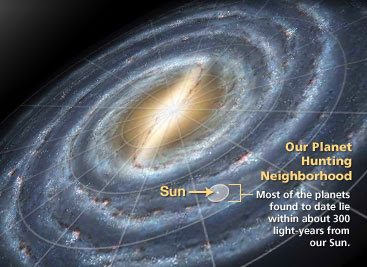PlanetQuest: Exoplanet Exploration
NASA's JPL/CalTech website reports the current exoplanet count at 453 as of June 19, 2010. The number of stars with planets is a bit lower and stands at 385, meaning that some stars have more than one planet orbiting them.
The image below is a screen shot (from this author's screen) of a widget for your desktop and can be downloaded from the PlanetQuest Planet Counter page. It will keep you current on the hunt for exoplanets, but you'll have to have Yahoo! Widgets installed to make it work.
As soon as the recent first data set from the Kepler mission, which is devoted to finding exoplanets (particularly, Earth-like planets), is fully analyzed, the count of exoplanets is sure to skyrocket. But right now, the data set, just released to the public, reports 306 exoplanet "candidates." That means those candidate explanets must still be confirmed before adding them to the official exoplanet count.
The Kepler Space Telescope was launched March 6, 2009, its mission lifetime expected to span four years of planet hunting. But there are several other concurrent efforts underway in the exoplanet game, including the Spitzer Space Telescope, the Keck Interferometer, the Large Binocular Telescope, the Hubble Space Telescope, EPOCh (Deep Impact), CoRoT, and MOST. Although these missions do contribute significantly to the exoplanet hunt, they are not entirely devoted to planet hunting. In fact, the two most well known missions, the Hubble Space Telescope and the Spitzer Space Telescope are better known for their studies of and spectacular views of entire galaxies and nebulae.
Currently, scientists are searching for exoplanets within only 500 lightyears of Earth. This is a very tiny area, considering that just our own Milky Way galaxy is about 100,000 lightyears across. There has been only 1 discovery of an exoplanet in another galaxy, the nearby Andromeda Galaxy, and that was a very lucky find and wasn't a result of actually looking for a planet in another galaxy.
Of course the next step is to determine if life might exist on any of those planets! Upcoming missions will allow us to begin analyzing the atmosphere of Earth-like exoplanets for the presence of carbon dioxide, water, and oxygen in the form of ozone (O3). Even though these three chemicals are necessary for life as we know it, extraterrestrial life may exist with different chemical requirements. But humanity's search for life elsewhere in the universe has to start somewhere, and we know the requirements best for life on Earth. Of course, even on Earth there are life forms known as extremophiles, some of which can survive and even prosper without oxygen, at very high or low temperatures, and in extremely acidic or salty environments.
Future missions currently planned to join in the hunt for exoplanets include SIM Lite, the Terrestrial Planet Finder Coronagraph, the Terrestrial Planet Finder Inteferometer, the James Webb Space Telescope, and Gaia.
What we will find is anyone's guess at this stage, but many astronomers and those officially involved in the exoplanet hunting communities are convinced that detecting Earth-like planets capable of supporting life is quite likely within the next decade. But confirming that life actually exists on any of those planets found is probably unlikely in the near future.
Many scientists think that we must start the process of finding extraterrestrial life right here in our own solar system by exploring some likely spots such as Io and Europa (moons of Jupiter), Titan and Enceladus (moons of Saturn), and of course Mars. Of course, finding extraterrestrial intelligence is quite another matter altogether. In the United States, that search is mostly being done by SETI (Search for Extraterrestrial Intelligence) at Berkley.
"Our Planet Hunting Neighborhood" image credit: NASA/JPL/CalTech
Sources:
"Extremophile", Wikipedia, the free encyclopedia
"Planet Quest: Missions", NASA/JPL/CalTech
"PlanetQuest: Exoplanet Exploration", NASA/JPL/CalTech
Clara Moskowitz, "Top 5 Bets for Extraterrestrial Life in the Solar System", Wired Science
© 2010 Gary D. Timothy
--------------------------
Note: This article may also be posted by me to Gather, Eclectic's Universe, RedGage, Associated Content, and SideTick.
Eclectic Universe toolbar - easy install/uninstall!
| toolbar powered by Conduit |
Saturday, June 19, 2010
Subscribe to:
Post Comments (Atom)







No comments:
Post a Comment